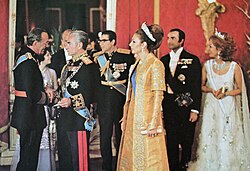Relations with the Islamic Republic
The Netherlands has condemned Iran over its nuclear program.
In 2011, the Dutch Foreign Minister announced the suspension of official relations between the Netherlands and Iran, after the Dutch-Iranian Zahra Bahrami was executed in Iran. [2] [3]
On June 7, 2018, the Netherlands expelled two Iranian diplomats accredited to the Iranian embassy. [4] In response, Iran summoned the Dutch ambassador in July 2018. [5]
In January 2019, the government of the Netherlands accused Iran of having arranged the assassinations of two Dutch nationals of Iranian origin: Mohammad-Reza Kolahi in 2015, and Ahmad Molla Nissi in 2017. The incident caused outcry both in the Netherlands and internationally; EU responded with sanctions against Iranian intelligence. [6] Iranian officials in turn accused the Netherlands of supporting the People's Mujahedin of Iran with its members in western Europe, [7] who Mohammad-Reza Kolahi is believed to be a part of. [8]
In January 2024, the Dutch government summoned the Iranian ambassador to the Netherlands following the death of a Dutch baby in an attack by Iran on Erbil. [9]




